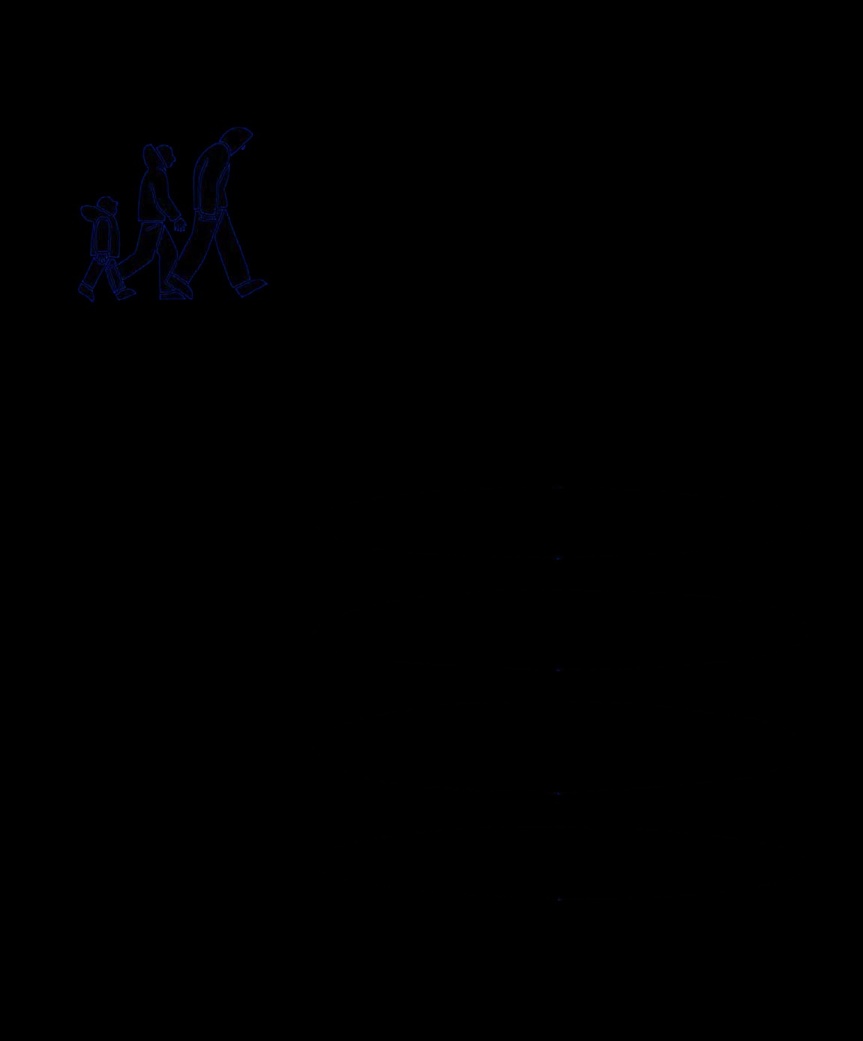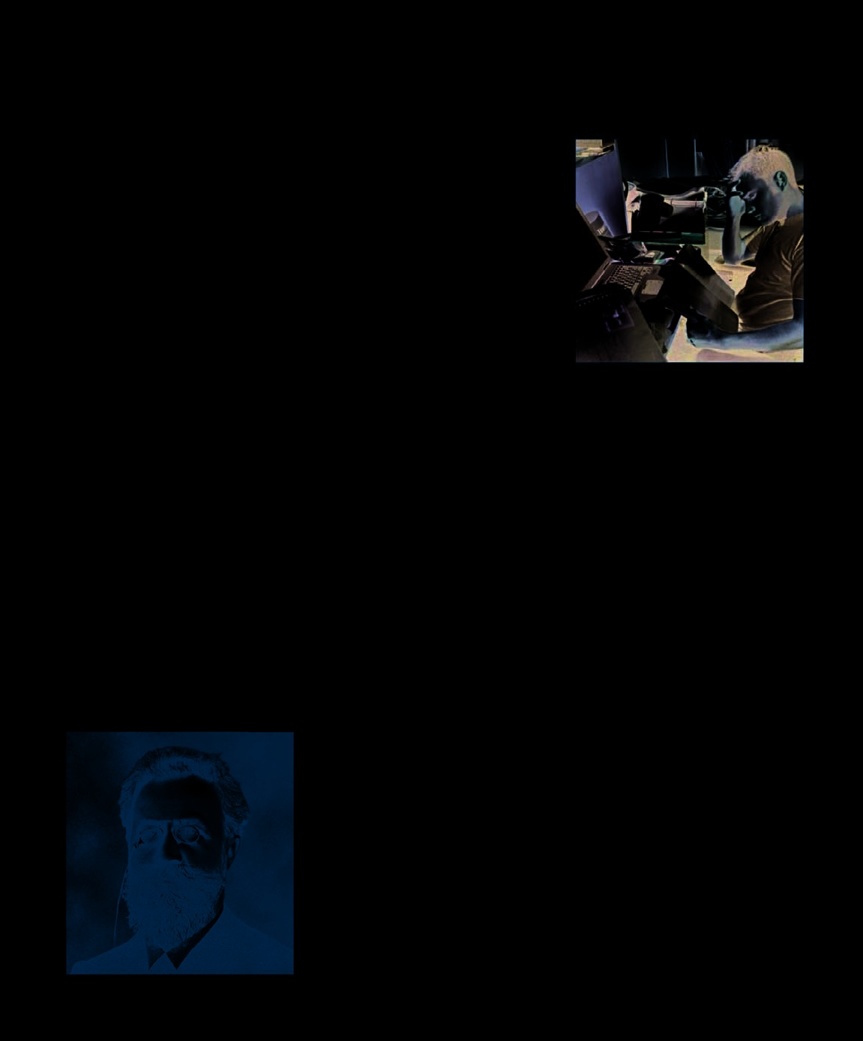The Psychology Book (15 page)
Read The Psychology Book Online
Authors: Unknown

question of whether the mind and
discipline, and were offering
Berkeley, referred to James as
body are separate or not to a more
degrees in the subject. Three
the “father of psychology.” ■
useful study of mental processes,
specialist psychology journals
such as attention, memory,
were also founded in that time,
reasoning, imagination, and
and a professional organization—
intention. James claimed his
the American Psychological
approach helped to move
Association—was formed.
philosophers and psychologists
James introduced experimental
“away from abstraction, fixed
psychology to America, despite
All these consciousnesses
principles, closed systems, and
claiming to “hate experimental
melt into each other
pretended absolutes and origins,
work.” He did so because he had
like dissolving views.
towards facts, action, and power.”
come to realize that it was the best
Properly they are but one
His insistence on focusing on the
way to prove or disprove a theory.
protracted consciousness,
wholeness of events, including the
But he continued to value the use of
one unbroken stream.
effects of different environments
introspection as a tool of discovery,
William James
on our actions—in contrast to the
especially of mental processes.
introspective, structuralist approach
The shift in the perception of
of breaking down our experiences
psychology and its concerns from
into small details—has also shaped
being considered, “a nasty little
our understanding of behavior.
subject” (in James’s words) into a

46
ADOLESCENCE
IS A N
G. STANLEY HAL E
L (1W B
844–1924) IRTH
IN CONTEXT
Human development
is determined by
APPROACH
nature
:
it is a repetition of our
“ancestral record
.
”
Human development
BEFORE
1905
Sigmund Freud, in
Three Essays on the Theory of
A child has
animallike dispositions
and goes through
several growth stages
.
Sexuality
, claims the teenage
years are the “genital stage.”
AFTER
1928
American anthropologist
Margaret Mead, in
Coming
At
adolescence
, the evolutionary momentum
of Age in Samoa
, declares
subsides; this is a time for
individual change
.
that adolescence is only
recognized as a distinct
stage of human development
in Western society.
During this wild, lawless time,
1950
Erik Erikson, in
teenagers are increasingly
sensitive, reckless,
Childhood and Society
,
self-conscious
, and prone to depression.
describes adolescence as
the stage of “Identity vs.
Role Confusion,” coining
the term “identity crisis.”
The child then emerges as an adult: a more
civilized,
1983
In
Margaret Mead
“higher-order” being
.
and Samoa
, New Zealand
anthropologist Derek Freeman
disputes Mead’s claim that
adolescence is merely a
socially constructed concept.
Adolescence is a new birth.

PHILOSOPHICAL ROOTS 47
See also:
Francis Galton 28–29 ■ Wilhelm Wundt 32–37 ■ Sigmund Freud 92–99 ■
Erik Erikson 272–73
T
he word “adolescence” “curve of despondency” that starts
literally means “growing
at the age of 11, peaks at 15, then
up” (from the Latin
falls steadily until the age of 23.
adolescere
). In theory, it describes
Modern research acknowledges
a distinct stage between childhood
a similar pattern. The causes of
and adulthood, but in practice often
depression that Hall identified are
simply defines the “teenage” years.
startlingly familiar: suspicion of
In most Western societies, the idea
being disliked and having seemingly
of adolescence was not recognized
insuperable character faults, and
until the 20th century; childhood
“the fancy of hopeless love.” He
ended and adulthood began at a
believed the self-consciousness of
G. Stanley Hall
certain age—typically at 18.
adolescence leads to self-criticism
Pioneering psychologist and
and censoriousness of self and
Born into a farming family
in Ashfield, Massachusetts,
educator, G. Stanley Hall, in his
others. This view mirrors later
Granville Stanley Hall
1904 book
Adolescence
, was the
studies, which argue that teenagers’
graduated from Williams
first academic to explore the subject.
advanced reasoning skills allow
College, Massachusetts in
Hall was influenced by Darwin’s
them to “read between the lines,”
1867. His plans to travel were
theory of evolution, believing that
while also magnifying their
thwarted through lack of
all childhoods, especially with
sensitivity to situations. Even Hall’s
funds, so he followed his
regard to behavior and early
claim that criminal activity is more
mother’s wish and studied
physical development, reflect the
prevalent in the teenage years,
theology for a year in New
course of evolutionary change, and
peaking around 18, still holds true.
York, before moving to
that we each develop in accordance
But Hall was not totally negative
Germany. On Hall’s return to
with our “ancestral record.”
about adolescence. As he wrote in
America in 1870, he studied
One key influence on Hall
Youth: Its Education, Regiment,
with William James for four
was the 18th-century
Sturm
and Hygiene
, “Adolescence is a
years at Harvard, gaining the
und Drang
(“Storm and Stress”)
new birth, for the higher and more
first psychology PhD in the
movement of German writers
completely human traits are now
US. He then returned to
Germany for two years to
and musicians, which promoted
born.” So, for Hall, adolescence
work with Wilhelm Wundt
total freedom of expression. Hall
was in fact a necessary beginning
in his Leipzig laboratory.
referred to adolescence as “Sturm
of something much better. ■
In 1882, Hall became a
und Drang;” he considered it a stage
professor at Johns Hopkins
of emotional turmoil and rebellion,
University, Baltimore, where he
with behavior ranging from quiet
set up the first US laboratory
moodiness to wild risk-taking.
specifically for psychology. He
Adolescence, he stated, “craves
also launched the
American
strong feelings and new sensations…
Journal of Psychology
in 1887,
monotony, routine, and detail are
Adolescence is when the
and became the first president
intolerable.” Awareness of self and
very worst and best impulses
of the American Psychological
the environment greatly increases;
in the human soul
Association in 1892.
everything is more keenly felt, and
struggle against each
sensation is sought for its own sake.
Key works
other for possession.
G. Stanley Hall
1904
Adolescence
Modern echoes
1906
Youth: Its Education,
Many of Hall’s findings are echoed
Regiment, and Hygiene
in research today. Hall believed that
1911
Educational Problems
adolescents are highly susceptible
1922
Senescence
to depression, and described a

48
24 HOURS AFTER
LEARNING SOMETHING,
WE FORGET
TWO-THIRDS OF IT
HERMANN EBBINGHAUS (1850–1909)
IN CONTEXT
APPROACH
…forgetting is
…items forgotten can be
Memory studies
most rapid within the
relearned faster
than new
BEFORE
first nine hours
.
ones learned for the first time.
5th century BCE
The
ancient Greeks make use of
“mnemonics”—techniques,
such as key words or rhymes,
that aid memory.
1582
Italian philosopher
Giordano Bruno in
The Art
…
meaningful
…material that
of Memory
gives methods for
things
are
is
studied
memorizing, using diagrams
Ebbinghaus’s
remembered
beyond
of knowledge and experience.
memory
for about
ten
mastery
experiments
times longer
(over-learned) is
AFTER
showed that…
than random,
remembered
1932
Frederick Bartlett says
meaningless
longer.
that every memory is a blend
things.
of knowledge and inference.
1949
Donald Hebb, in
The
Organization of Behavior,
describes how learning results
from stimulated brain cells
linking up into “assemblies.”
…items toward the
…repeated learning sessions
1960
US psychologist Leo
beginning and end of
over a
longer interval of
Postman finds that new
a series
are most easily
time
improves memory
learning can interfere with
remembered.
retention on any subject.
previous learning, causing
“retroactive interference.”

